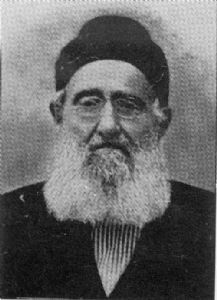A Short Tribute
Hacham Ezra Hacohen Trab was born to Esther and Hacham Eliyahu in Damascus. He learned Torah from his father and from the Damascus sages, in particular from Hacham Haim Romano, who was a dayan in Hacham Yitzhak Aboulafia's rabbinic court in Damascus.
He was a diligent Torah scholar, and accomplished in all facets of Torah, Halakha, commentary and mysticism. He preached his sermons, which he eventually wrote down, for large audiences at the Shama'a Great Synagogue every Sabbath and festival. He officiated as head of the yeshiva and head of the Damascus Rabbinic Court and, having a pleasant voice, also regularly officiated as cantor at the Alfrange synagogue.
Hacham Ezra Hacohen Trab Mesalton married Leah and the couple had two sons and three daughters. Their son Hacham Yehuda was a Torah scholar and officiated as Av Bet Din of the Cairo Rabbinic Court. Hacham Meir, their other son, a shochet and mohel, died at a young age.
Hacham Ezra Hacohen Trab Mesalton was a prolific author who would rise during the night to write his original commentary. He published three books during his lifetime: Sha'arei Ezra – Responsa, Sepher Ezra and VaYomer Ezra. His son Hacham Yehuda published an additional one of his books, Milei D'Ezra; two additional books have remained in manuscript form – Li L'Ezra and Petach HaEzra.
Hacham Ezra Hacohen Trab Mesalton passed away on 28 Shevat, 5580 (1920).
